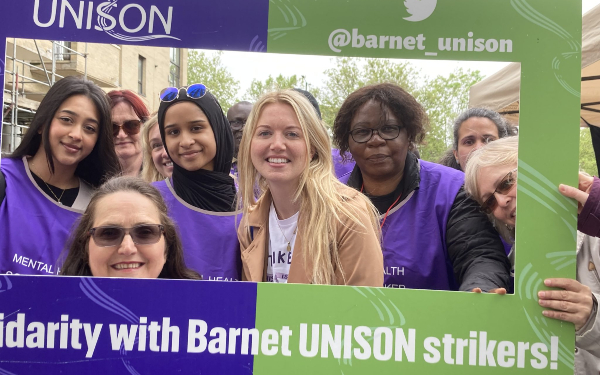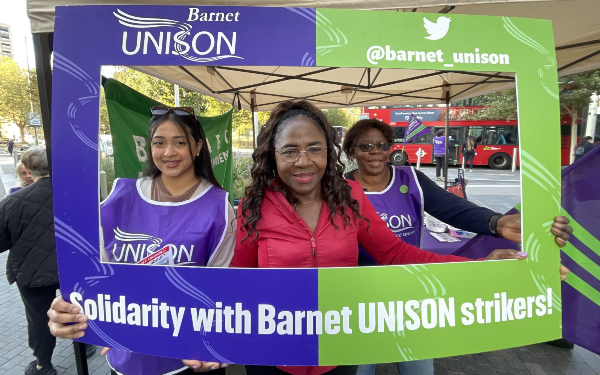UK
‘We walked out for 81 days and the service is as unsafe as it was before’
Mental health social workers have been in dispute with Barnet Council over staffing levels in their teams since September 2023. They tell Community Care that little has changed despite 81 days of strike action

“We walked out for 81 days and it made no difference. They aren’t listening to us. It’s as dangerous a service as it was when the dispute started.”
This is Sophie, a mental health social worker who took part in one of the biggest social work strikes in decades, at Barnet Council in London.
She – and colleagues – staged their first walkout on 26 September 2023 and their campaign culminated in a 12-week strike, from May to July 2024. In total, they were out for 81 days.
Dispute unresolved after 81-day strike
The causes of the dispute were working conditions, staffing levels and rates of turnover that the social workers and their union – Barnet UNISON – claimed were unsafe.
However, despite their action, the dispute – which concerns Barnet’s north and south mental health teams and its approved mental health professional (AMHP) service – is stuck and remains unresolved.
The council continues to reject the social workers’ core argument: that staffing levels in the teams are inadequate and practitioner turnover excessive, resulting in services that are unsafe for mental health service users.
Instead, the authority argues that the teams’ experience reflects a national issue with the recruitment and retention of social workers, in mental health and in adults’ services more generally.
Union’s call for 10% market supplement rejected
The authority also rejects Barnet UNISON’s proposed solution: a 10% market supplement on top of salary for staff in the three teams, arguing that the mental health practitioners’ pay compares well with that in other London boroughs.
Its counter-offer is a 5% supplement for a much larger number of practitioners – about 200 – in adults’ services, again on the grounds that the staffing issues faced by the mental health practitioners are not peculiar to their teams.
Barnet UNISON has pointed out, repeatedly, that the council’s proposal is more expensive than its own.
After strike action failed to break the impasse, the teams returned to work and further industrial action is not on the cards.
Half of staff have left, according to UNISON
However, the make-up of the teams has changed dramatically over that time.
Like many colleagues, Sophie is no longer in her post. According to Barnet UNISON, 50% of permanent staff in post across the three teams as of 1 January 2024 had left the council as of last month.

Photo: Yurii Kibalnik/Adobe Stock
This compares to a national turnover rate for social workers in English adults’ services of 14.5% in the year to September 2023.
Roots of the dispute
The roots of the dispute, according to UNISON, lie in the transfer of social care services that were were previously integrated with health, under Barnet, Enfield and Haringey Mental Health NHS Trust. to the council, earlier in the decade.
Barnet is far from the only authority to have taken this step over recent years. Other previously integrated and NHS-managed services have broken up, with some councils arguing that core local authority duties under the Care Act were not being adequately met under these arrangements, because health service priorities took over.
However, for the practitioners we spoke to for this article, the result of the Barnet transformation has been bad for the quality of services received by people in distress.
Lack of access to records ‘incredibly dangerous’
For example, while working in the integrated service, the social workers used the same case management system as their NHS colleagues, enabling seamless sharing of information.
Now, they say, they have a separate system to NHS practitioners, meaning they lack access to people’s medical records when they are referred to the social work service.
Says Sophie: “The social workers, apart from AMHPs, don’t have access to those [NHS] records, which is incredibly dangerous. It’s their entire mental health record – their diagnosis, their section history, their ward notes. These are issues that we were raising three years ago – and these are still issues now.”
They say it is no coincidence that several of those to have left the authority in the past year have moved to integrated mental health services.
‘My job is managing referrals, not being a social worker’
Practitioners say that other problems were created by the way the mental health services were returned to council control.
Notably, the authority’s front door service did not take on responsibility for calls relating to mental health, meaning they there is no triage of initial referrals before they reach the north and south teams.

Picture posed by model (credit: Adobe Stock)
“My job’s changed from being a social worker to managing referrals,” says Kimberley, a lead practitioner who also left the service after speaking to Community Care for this article.
Referrals ‘taking more than 16 weeks at one point’
“And we’re so far behind on it, because we’re not resourced to deal with it. There’s a policy where you have to deal with a referral within five days. We were over 16 weeks at one point.
“And some people email us because they think the person is going to take their own life and they don’t realise they need to contact the crisis service. Sixteen weeks is way too late for people.”
As well as being dangerous for individuals, she says this is costly, resulting in people ending up in hospital where this could have been avoided with an earlier response that would have enabled practitioners to signpost them to NHS crisis services.
According to Barnet UNISON, the council agreed, in 2022, that mental health referrals would move to the social care front door once staff in that service had been trained. However, two years on, this has not happened.
Waiting times of up to 17 months
Once the team do respond to referrals, those eligible for a service are added to a waiting list, the length of which has been a core issue in the dispute.
The social workers say that, as of August this year, people were waiting a maximum of 17 months to be seen by a practitioner.

Photo: fotolia/tiko
“This is much too long for people with mental ill-health, and they are really deteriorating without our support,” says Kimberley.
They also claim that, once the person is seen and assessed, there is pressure to close cases quickly by putting in a care package.
Says Sophie: “Recently, an email went out that if we’re keeping cases open for longer than a month, we need to look at that. But in mental health, it can take a month to track your service user down.
“We are working with people who have suffered real trauma, who are among the most marginalised people in the country. They deserve more than a month.”
‘People need a social worker, not a care package’
Kimberley adds that what people often need is direct work from a social worker, not a care package.
“For most of our service users, we are the resource,” she adds. “We are best placed to work with them and help them take those small steps to build their independence so they don’t need a care package in future.”
For the social workers, working under these practice conditions has generated burnout and high levels of stress.
‘The overwhelm is incredibly high’
“People are working late to try and keep people safe and contain things because they are going in immediately where there’s a fire,” says Kimberley. “The overwhelm that people feel is incredibly high.”
Those who have left, she says, have reported a positive impact on their health.
“Workers who have left talked about how their physical health has improved since leaving, how with the state they were in, their body wasn’t able to heal.”
As well as an exodus of permanent staff, the teams have also faced high levels of agency worker turnover, which has not been good for mental health service users, the practitioners say.
Agency staff leaving ‘still has a massive impact’
Katie, another social worker who left the council after speaking to Community Care, recalls being given a high-risk safeguarding case, involving serious self-neglect, that had been previously held by two agency staff, when she was newly qualified.
“There will be loads of examples like that across the team,” she says. “Agency staff leaving still has a massive impact on the team.”
The practitioners add that, as in Katie’s experience, newly qualified and early career social workers have been loaded with significant responsibilities due to the loss of experienced colleagues.
Pressure on newly qualified social workers
One newly qualified social worker recalls: “I was recently given a case given to me to do with the Court of Protection. No one has experience or training in the Court of Protection. So whom do I rely on?”
These experiences were the catalyst for the practitioners’ campaign of strike action.

UNISON vice president Julia Mwaluke on the picket line with Barnet UNISON members (credit: Barnet UNISON)
But, despite 81 days on the picket line, they say they returned to an unchanged situation.
“Coming back after strike, the management don’t acknowledge it, we raise problems and they just don’t go anywhere,” says another social worker.
“My concern is, how can I practise safely as a social worker? I really can’t do a proper job. It’s just so frustrating.”
‘The strike was about making things better’
“There were a lot of things we liked about the service,” says Katie. [The strike] was about making things better so we could stay, and make it a safe service, not just for the service users but for ourselves as employees.”
She adds: “I’m not leaving because of the strike, I’m leaving because, through the strike, it’s become very apparent that nothing is going to get any better, as they don’t seem to value our opinion or our feedback.”
Throughout the industrial action, the practitioners have been supported by Barnet UNISON branch secretary John Burgess, himself a former mental health social worker.
‘It’s unsafe and we will continue to be public about that’
“You can’t continue strike action when you’ve lost most of the workforce,” he says. “The council is saying, ‘if you agree to 5% the dispute’s over’, but we rejected that months ago.”
“Those who are left…I’ve no doubt that some of them are making plans to leave unless things change…It’s an unsafe workplace and we will continue to be public about that.”
Community Care put the concerns voiced by the social workers in this article to Barnet Council.
‘Our pay compares well with other boroughs’
In response, a spokesperson for the authority said: “Barnet UNISON has requested a significant recruitment and retention payment for qualified social workers in the three teams.
“While we appreciate how hard our mental health social workers work, analysis shows that our pay compares well to other outer London boroughs.
“We are not aware of any London borough paying a market supplement for recruitment and retention just to mental health social work teams, nor of a greater recruitment and retention challenge in those teams compared to our wider adult social care service.
“Levels of permanent staffing in the striking teams are around 80%.
Council ‘remains open to discussions’
“We are continuing to work with unions and staff in the service to address the concerns that have been raised. We met UNISON earlier in the summer, where both UNISON and the council agreed on several next steps and also agreed to meet again.
“We remain open to continuing discussions.”
 F
F










